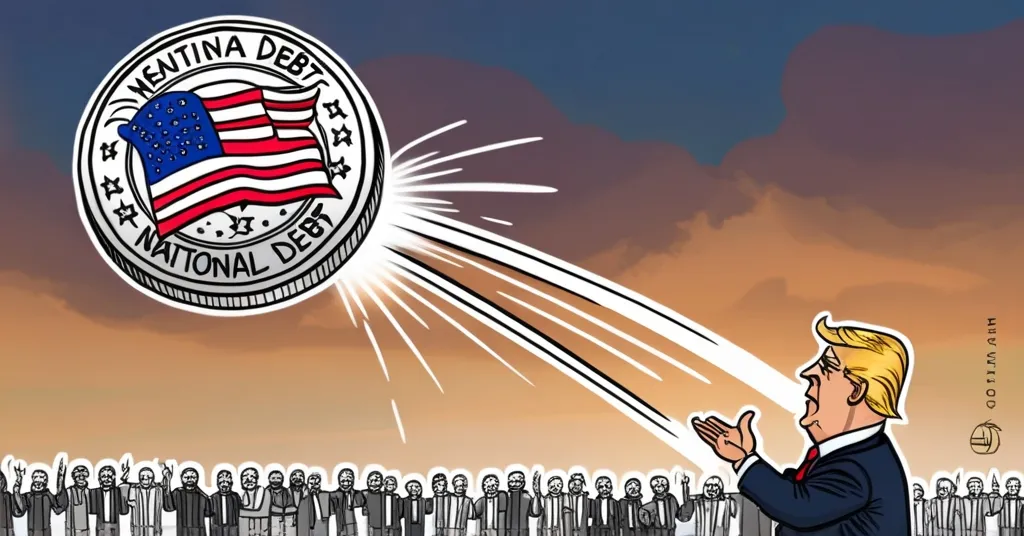Mark Cuban Launches Meme Coin to Tackle U.S. National Debt, Critiques $TRUMP Token

Mark Cuban’s Bold Meme Coin Move: Aiming to Slash U.S. National Debt
Mark Cuban, the billionaire investor known for his candid takes and entrepreneurial spirit, has announced a new meme coin initiative designed to tackle the U.S. national debt. Inspired by the recent $TRUMP token, Cuban’s plan aims to redirect the speculative energy of meme coins towards a societal cause. However, his venture also casts a critical eye on the broader implications of such tokens in the cryptocurrency market.
- Mark Cuban announces a new meme coin to mimic the $TRUMP token.
- All proceeds to be directed to the U.S. Treasury to reduce national debt.
- Cuban expresses concerns about the $TRUMP token’s impact on crypto credibility.
Cuban’s latest venture into the world of cryptocurrency isn’t your typical meme coin gamble. A meme coin, for those unfamiliar, is a cryptocurrency often inspired by internet memes and fueled by social media trends rather than any intrinsic value. Cuban’s coin will follow the same structural blueprint as the $TRUMP token, with only 20% available for trading—80% of the pie is staying in the oven, and the rest is going straight to Uncle Sam.
“If meme coins are the way, maybe I’ll issue one. With a twist. Same terms as $TRUMP. 20% float. Same release schedule. One difference: All the revenue from the sale of the coins goes to the U.S. Treasury.”
This statement from Cuban highlights a novel approach to the often frivolous nature of meme coins. By directing all revenue to the U.S. Treasury, Cuban aims to use the speculative frenzy of these digital assets to make a tangible impact on the country’s financial health. It’s a bit like betting on a sports team based on fan enthusiasm rather than performance statistics, but with a noble twist.
But Cuban isn’t just launching a coin; he’s also taking a swipe at the credibility of the cryptocurrency market. He’s particularly critical of the $TRUMP token, launched by former President Donald Trump, and its potential to sour the industry’s reputation. Cuban believes that the poor start of the $TRUMP token could set back the progress in regulating digital assets at a time when clarity is desperately needed.
“The poor start of the $TRUMP token could negatively impact the digital asset market.”
This concern ties into the broader regulatory environment, where initiatives like the Financial Innovation and Technology for the 21st Century Act (FIT21 Act) are being discussed. The FIT21 Act is a legislative proposal aimed at defining the legal status of digital assets, which could provide much-needed clarity to the industry. Cuban’s critique suggests that the timing of such tokens could hinder these efforts.
Cuban’s sharpest criticism is reserved for the TRUMP and MELANIA tokens, launched by Donald and Melania Trump. He points out potential ethical conflicts and the broader implications for the crypto market. These tokens, marketed as expressions of support rather than investments or securities, raise questions about the involvement of high-profile figures in cryptocurrency ventures.
“If you want to gamble, gamble. But at least use it to make a dent in the U.S. debt.”
This quip from Cuban underscores his frustration with the status quo of meme coins and his desire to see them used for a greater good. However, while Cuban’s initiative is well-intentioned, the crypto world is rife with scams and hype. His coin, while aiming to do good, will need to navigate these treacherous waters carefully to make a real difference.
The concept of using decentralized finance for societal benefit is intriguing, but it’s not without its skeptics. Some in the crypto community question the feasibility of Cuban’s plan. Can a meme coin, often seen as a speculative gamble, really make a dent in the U.S. national debt? It’s a bold experiment that tests the limits of what these digital assets can achieve beyond personal gain.
As we watch this unfold, it’s clear that the intersection of celebrity, crypto, and social good is becoming increasingly complex. Cuban’s meme coin is a fascinating experiment in whether the speculative energy of the crypto market can be harnessed for a cause beyond personal gain. And let’s face it, who wouldn’t want to see a meme coin actually make a difference?
Key Questions and Takeaways
- What is the purpose of Mark Cuban’s new meme coin?
Mark Cuban’s new meme coin aims to mimic the TRUMP token but with a unique purpose: all revenue from its sale will go to the U.S. Treasury to help reduce the national debt.
- How does Cuban’s meme coin differ from the TRUMP token?
While structurally similar, Cuban’s meme coin will direct all proceeds to the U.S. Treasury, whereas the TRUMP token does not have such a directive.
- What concerns does Cuban have about the TRUMP token?
Cuban is concerned that the TRUMP token’s poor start could negatively impact the credibility of the digital asset market and hinder efforts to regulate cryptocurrencies properly.
- What is the FIT21 Act, and why is it mentioned?
The FIT21 Act is a legislative proposal aimed at defining the legal status of digital assets. It is mentioned in the context of ongoing efforts to create a regulatory framework for cryptocurrencies.
- What ethical issues does Cuban raise regarding the TRUMP and MELANIA tokens?
Cuban highlights potential conflicts of interest and ethical concerns due to the involvement of former President Donald Trump and First Lady Melania Trump in launching these tokens, especially as they are marketed as expressions of support rather than investments or securities.
- How does Cuban view the role of meme coins in the cryptocurrency ecosystem?
Cuban sees meme coins as speculative assets but suggests they can be used for positive societal impact, as demonstrated by his plan to use the proceeds from his meme coin to reduce the U.S. national debt.
The potential for meme coins to contribute to social good is an idea worth pondering. Can these often-irreverent digital assets be harnessed for more than just speculation? Cuban’s initiative challenges us to consider the broader implications of cryptocurrency in our society, pushing the boundaries of what’s possible in the world of decentralized finance.



